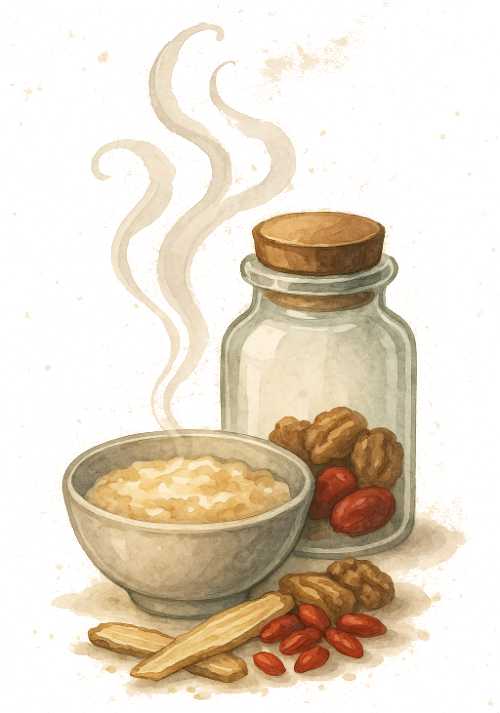TCM Treatments for Alzheimer’s:
A Supportive Pathway
Alzheimer’s disease is a progressive neurodegenerative disorder that gradually erodes memory, language, and cognitive function. While there is no known cure, many families and patients seek ways to slow decline, improve daily functioning, and preserve quality of life. In Traditional Chinese Medicine (TCM), treatment focuses not on reversing the condition, but on nourishing the body and calming the mind—supporting both the patient and their caregivers.
In TCM theory, memory and cognition are closely tied to several organ systems: the Heart (which houses the Shen, or Spirit), the Spleen (which governs thinking and memory), the Kidneys (which store essence and nourish the brain), and the Liver (which supports circulation and emotional balance). These systems may decline with age, but TCM treatment aims to slow this process, restore harmony, and ease related symptoms like anxiety, insomnia, or confusion.
Pattern Diagnosis: Finding the Root
Before choosing a treatment approach, a TCM practitioner identifies the underlying pattern. Alzheimer’s may manifest in different ways, and TCM recognizes this by treating the individual, not just the disease label.
Common patterns include:
- Kidney Essence Deficiency – associated with memory loss, weak knees, dizziness, and premature aging.
- Heart Blood Deficiency – often linked to forgetfulness, anxiety, and poor sleep.
- Phlegm Misting the Mind – marked by mental cloudiness, confusion, and lack of clarity.
- Liver Qi Stagnation – connected to mood changes, frustration, and emotional withdrawal.
Each of these patterns leads to a different therapeutic approach.
Acupuncture: Supporting the Spirit and Circulation
Acupuncture is commonly used to calm the Shen, promote mental clarity, and support circulation to the head. Point selection depends on the pattern but may include points along the Heart, Kidney, and Governing Vessel meridians. For those with agitation, restlessness, or insomnia, calming points may be emphasized. In cases of physical weakness, points that tonify Qi and nourish Essence may be selected.
Regular acupuncture treatments can help regulate sleep, ease anxiety, and reduce overstimulation—factors that frequently worsen cognitive symptoms. Even in advanced cases, the calming effect of acupuncture may offer comfort and emotional support.
Herbal Medicine: Nourishing from Within
Herbal formulas are carefully tailored to each pattern and adjusted as symptoms evolve. A patient with Kidney essence deficiency might receive herbs that strengthen the foundational energy of the body, while one with Phlegm Misting the Mind may be given herbs that resolve dampness and open the sensory orifices.
Formulas are almost never one-size-fits-all. A skilled herbalist considers digestion, appetite, emotional state, and medication use before prescribing. While herbs will not cure Alzheimer’s, they may help manage related issues like sleep disruption, restlessness, or fatigue.
Qigong and Gentle Movement
When appropriate, patients or caregivers may be introduced to gentle Qigong exercises to support mental clarity and body awareness. Even simple breathing techniques can help regulate the nervous system and encourage a deeper sense of calm.
In early stages, movement routines may help maintain balance and spatial awareness. In later stages, a caregiver-led practice such as slow walking, breathing with touch, or rhythmic rocking can help soothe agitation and reestablish gentle human connection.
Caregiver Inclusion and the Emotional Landscape
A unique feature of TCM treatment is the inclusion of caregiver well-being as part of the treatment context. The emotional atmosphere of the household, the caregiver’s sleep and mood, and the quality of daily rhythms are considered part of the healing environment. In this sense, TCM views the individual within their network—not as a body isolated from its context, but as a part of a relational system that can be nourished, strengthened, and calmed.
Conclusion
While TCM cannot stop the progression of Alzheimer’s, it offers meaningful support to those living with the condition. By treating root imbalances and supporting the spirit, it helps patients maintain dignity, find comfort, and stay connected to the rhythms of life for as long as possible.
Vocabulary Guide
- Shen (神 shén) – The spirit or consciousness; housed in the heart and associated with awareness, memory, and emotional stability.
- Kidney essence (肾精 shèn jīng) – A vital substance stored by the kidneys that nourishes the brain and supports longevity and memory.
- Heart blood deficiency (心血虚 xīn xuè xū) – A pattern marked by poor memory, insomnia, and emotional fragility due to insufficient nourishment of the spirit.
- Phlegm misting the mind (痰迷心窍 tán mí xīn qiào) – A TCM pattern describing cognitive fog, confusion, or disorientation caused by internal obstruction.
- Liver qi stagnation (肝气郁结 gān qì yù jié) – Emotional tension or frustration that disrupts the flow of qi, potentially affecting mood and focus.
- Qigong (气功 qìgōng) – A traditional practice of breath, posture, and gentle movement used to regulate and strengthen the body’s vital energy.


